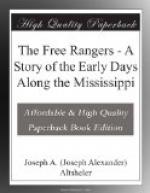They had the bayou on one side and a little bay of the river on the other, and they could not be surrounded by land. The foe was always straight before them, in a way, eye to eye, and there they sent bullets that rarely missed.
A fever was in their blood, the long battle, its tremendous events, and the new phase that it had now assumed, set every nerve to going. Certain faculties useless for that crisis had become atrophied for the time. They no longer heard the sounds of the cannon shots over their heads or the shouts of the men on the boats, they saw and heard nothing but their own battle and what lay directly in front of them.
The position was growing more dangerous. Their searching fire had drawn upon them an enemy always increasing in numbers. The savages converged in front of them in a semicircle, and their fire grew heavier and heavier. Bullets whistled over them, struck the earth about them, or clipped their clothing.
Another fugitive passed them and escaped, and then yet another. It was evident that their task was not yet done, and they would not leave, although the fire poured upon them, still increased in heat and the bullets came in showers.
Presently the attack seemed to veer away from them somewhat, as if the attention of the enemy were turned elsewhere, and Paul, who was at the end of the line, crept forward a little in the thicket. The fever was still burning in his veins and he was anxious to see what lay in front of him. He did not hear the warning cries of his comrades, or, if hearing, he did not heed them. He was still burning with the desire to see what lay there in the depths of the forest. Paul, the scholar, the thinker, the future statesman, had become transformed. In such a surcharged atmosphere he, too, had turned into the primitive man, the fighter, the man who looks upon every other man not proven a friend, as his natural enemy. The bullets had ceased for the time being to whistle above his head and to strike up the earth about him. He became conscious once more of the cannon shots, shrieking over him, and the crash of the rifle fire came from right and left.
A stick broke under Paul and he heard a shout in front of him. The shout was so fierce, so fully charged with malice, that he sprang to his feet as if he had been propelled by an electric shock. He stood face to face with Don Francisco Alvarez, the plotter, the rebel, and leader of the attacking army, a wild and terrible figure, clothes torn, bleeding from wounds, but animated now by a savage joy. His pistol was leveled at the surprised youth, and the next moment the deadly bullet would have been sped, but a tall black-robed figure rose up from the bushes and threw Alvarez back.
“Francisco Alvarez, thou hast done crime enough already!” exclaimed the priest.
Alvarez regained his balance, cast one look of hate at the man who had intervened, and cried:
“Ha! it is you, priest, who have come in my way once more! Then go the way of martyrdom!”




